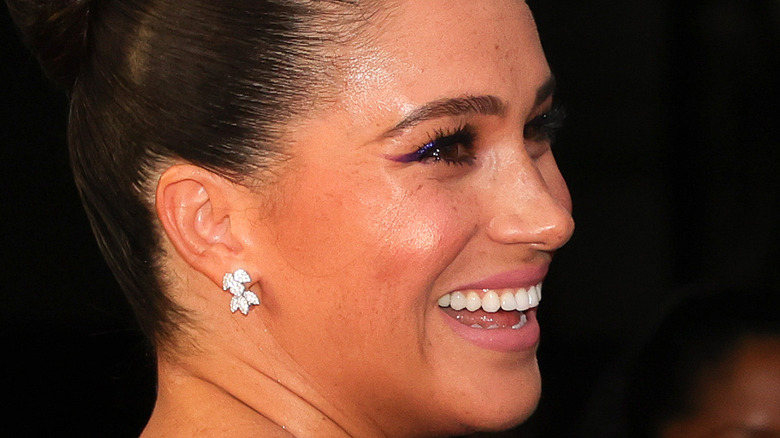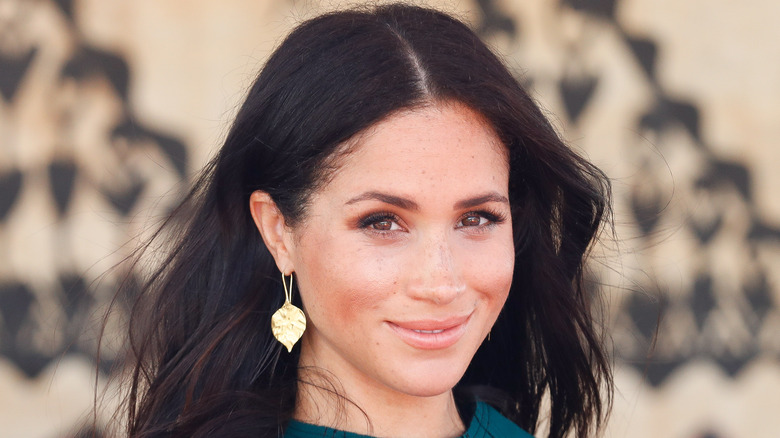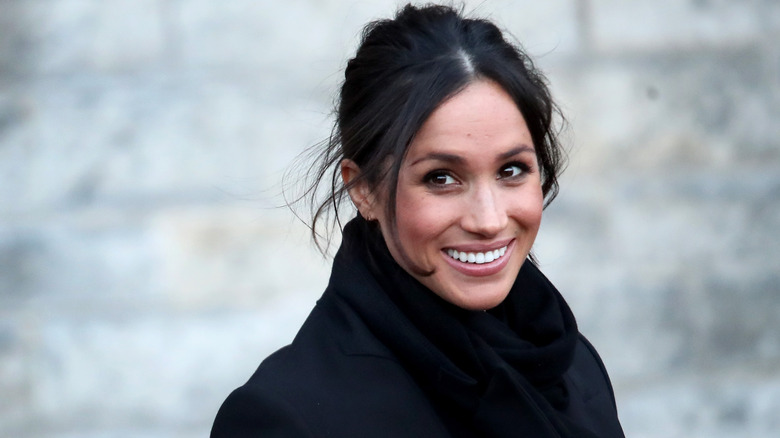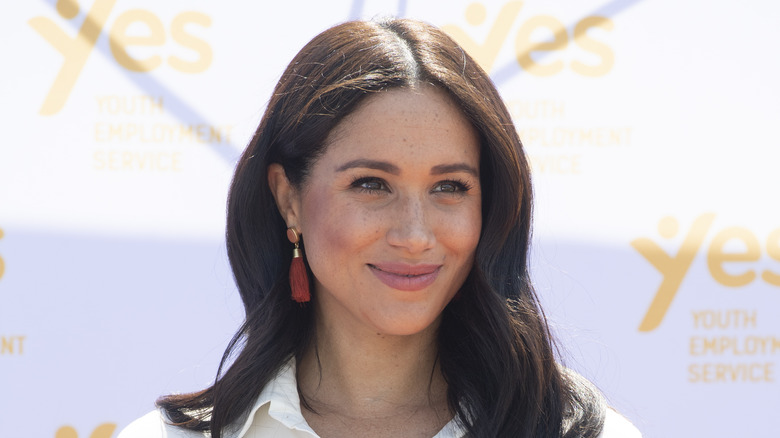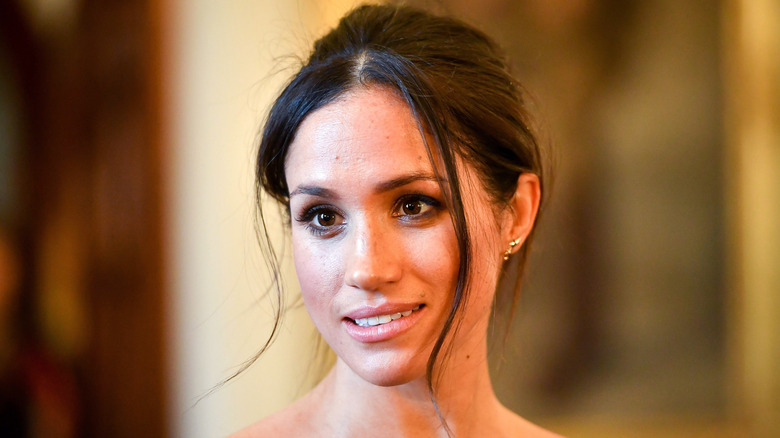The Unexpected Word Meghan Markle Is Trying To Trademark
Over the past two years, Meghan Markle and Prince Harry have caused a stir in the world of intellectual property. In 2020 the Duke and Duchess of Sussex attempted to trademark the name "Sussex Royal" and hoped to use the brand in diverse ways from pajamas and magazines to charities and educational ventures, per The Guardian. However, the application for the trademark received multiple objections, per BBC, and it was eventually withdrawn (via the Independent). Specifically, the use of the word "royal" caused turmoil, as well as speculation that Queen Elizabeth decided the couple could not use it as part of their brand. A source told the Daily Mail, "If [Harry and Meghan] aren't carrying out official duties and are now seeking other commercial opportunities, they simply cannot be allowed to market themselves as royals."
After abandoning the "Sussex Royal" idea, Meghan and Harry chose a new name: Archewell. After filing trademark applications all over the world to protect their choice, the duke and duchess got involved in a legal argument with a cosmetic company in the Philippines that wanted to use the name Archewell Harvatera. However, Harry and Meghan decided not to pursue their objections, allowing both names to coexist, per World Trademark Review. Now Meghan is once again attempting to protect her ideas via trademark, and she's causing quite an uproar.
Meghan wants to own the name Archetypes
In December 2020, Meghan Markle and Prince Harry signed a huge $25 million contract with Spotify, per Vanity Fair. Following a brief holiday program that appeared that same year, the world has been eagerly awaiting more content from Archewell. In March, "Archetypes," Meghan's Spotify podcast, was officially announced.
In order to protect her show's title, Meghan filed a patent. But can she claim ownership of a word with a long history? While archetype is defined as the "original pattern from which copies are made," per Online Etymology, Meghan is hardly the first person to use this word. Not only does "archetype" have Greek origins, but it's also been used as an English word since sometime between 1540 and 1600.
Words and their inherent power are clearly important to Meghan. "This is 'Archetypes' — the podcast where we dissect, explore, and subvert the labels that try to hold women back," she says in an audio teaser for her show, per Vanity Fair. According to the Daily Mail, the Duchess of Sussex specifically wants to have exclusive use over "Archetypes" for products associated with "the fields of cultural treatment of women and stereotypes facing women." Specifically, Meghan is looking to protect her show's title in all the different forms of electronic media as well as DVDs and CDs. However, she could face some legal obstacles from companies already using the name, such as Archetypes, a trademarked organization that sells cleaning products.
Does the duchess have a case?
While some people have viewed Meghan Markle's latest trademark request with derision, others view it as another sign of her savvy approach to business. "The Duke and Duchess of Sussex are signaling serious intent to invest and build 'Archetypes' into a market leading podcast," Paul Mackman, Managing Director of Mackman Branding & Marketing Agency, told Newsweek. "The benefits to trademarking brands are all about protection and defense. It helps to prevent others impersonating or stealing brand assets."
Despite archetypes being a commonly-used word, Meghan has a shot at obtaining her trademark. To succeed, the duchess will have to demonstrate that her use of the word has its own unique slant, separate from the dictionary definition. She'll also have to differentiate her vision of "Archetypes" from any products with the same name, per Woman and Home.
The Duke and Duchess of Sussex have been displaying their business acumen since they left their roles as working royals. The couple owns a network of 11 companies based in Delaware, according to The Telegraph. In addition, Meghan has been an entrepreneur since childhood. During an interview with The New York Times, she talked about her first foray into business. "I remember when I was really young, I must have been eight or nine, I started making scrunchies to sell," Meghan said. She added, "I had invested in myself and done this labor and been compensated for it. There's a sense of pride that comes from that."
Meghan Markle is likely facing an uphill battle
The former "Suits" star could have a major fight on her hands, particularly given a similar precedent set by another celebrity. In a tweet, the Daily Mail's Diary editor Richard Eden claimed, "The Duchess of Sussex's latest legal move is likely to raise eyebrows." As Eden argued, in his latest column for Mail Plus, Victoria Beckham attempted to trademark her Spice Girls nickname, Posh, back in 2002 by claiming it was "'inexorably associated" with her. Beckham wanted to prevent local soccer team Peterborough United from trademarking it instead, as the club's nickname. Judging by their website, though, she was not successful.
However, fellow pop star Taylor Swift subsequently managed to trademark the phrases "Party Like It's 1989" and "This Sick Beat," among several others, in 2015, per legal database Justia (via Vox). As a result, the phrases, all of which were taken from cuts off her hit album "1989," were prohibited from being licensed for all kinds of products, from non-medicated toiletries to Christmas stockings. It remains unclear whether Meghan Markle and Prince Harry wish to break into the lucrative merchandise arena, but if the trademarking of "Archetypes" is successful, the couple might soon find themselves sitting on a goldmine.
The duchess has been successful in court before
Although Meghan Markle's trademark case might seem like a long shot, it's worth remembering she's been successful elsewhere. As The Guardian reported, the duchess only recently won her landmark case against the Mail on Sunday for invasion of privacy and copyright infringement. Meghan was slated to receive a symbolic £1 in damages. Meghan's big win in court was about the principle of the matter rather than any kind of payout, as the duchess made clear. Although the Mail, and sister site MailOnline, attempted to appeal the case, they eventually accepted defeat and acknowledged their wrongdoing in publishing a private letter Meghan had written to her estranged father, Thomas Markle.
The case took three long years to finally settle, with both publications instructed to print front and homepage statements confirming they'd lost it. Per Reuters, the court ultimately ruled that the contents of Meghan's letter "were personal, private and not matters of legitimate public interest." They threw out an appeal, from publisher Associated Newspapers, based on newsworthiness. In a statement, Meghan called for the overhaul of the tabloid industry entirely, pointing to their dubious methods in obtaining information on celebrities.
"This is a victory not just for me, but for anyone who has ever felt scared to stand up for what's right," she stated emphatically. Meghan might soon be victorious in court once again.
